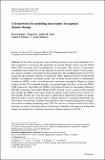A framework for modeling uncertainty in regional climate change
Author(s)
Monier, Erwan; Gao, Xiang; Scott, Jeffery R.; Sokolov, Andrei P.; Schlosser, Courtney Adam
Download10584_2014_Article_1112.pdf (6.793Mb)
PUBLISHER_CC
Publisher with Creative Commons License
Creative Commons Attribution
Terms of use
Metadata
Show full item recordAbstract
In this study, we present a new modeling framework and a large ensemble of climate projections to investigate the uncertainty in regional climate change over the United States (US) associated with four dimensions of uncertainty. The sources of uncertainty considered in this framework are the emissions projections, global climate system parameters, natural variability and model structural uncertainty. The modeling framework revolves around the Massachusetts Institute of Technology (MIT) Integrated Global System Model (IGSM), an integrated assessment model with an Earth System Model of Intermediate Complexity (EMIC) (with a two-dimensional zonal-mean atmosphere). Regional climate change over the US is obtained through a two-pronged approach. First, we use the IGSM-CAM framework, which links the IGSM to the National Center for Atmospheric Research (NCAR) Community Atmosphere Model (CAM). Second, we use a pattern-scaling method that extends the IGSM zonal mean based on climate change patterns from various climate models. Results show that the range of annual mean temperature changes are mainly driven by policy choices and the range of climate sensitivity considered. Meanwhile, the four sources of uncertainty contribute more equally to end-of-century precipitation changes, with natural variability dominating until 2050. For the set of scenarios used in this study, the choice of policy is the largest driver of uncertainty, defined as the range of warming and changes in precipitation, in future projections of climate change over the US.
Date issued
2014-06Department
Massachusetts Institute of Technology. Joint Program on the Science & Policy of Global ChangeJournal
Climatic Change
Publisher
Springer Netherlands
Citation
Monier, Erwan, Xiang Gao, Jeffery R. Scott, Andrei P. Sokolov, and C. Adam Schlosser. "A framework for modeling uncertainty in regional climate change." Climatic Change 131:1 (2015), pp.51–66.
Version: Final published version
ISSN
0165-0009
1573-1480